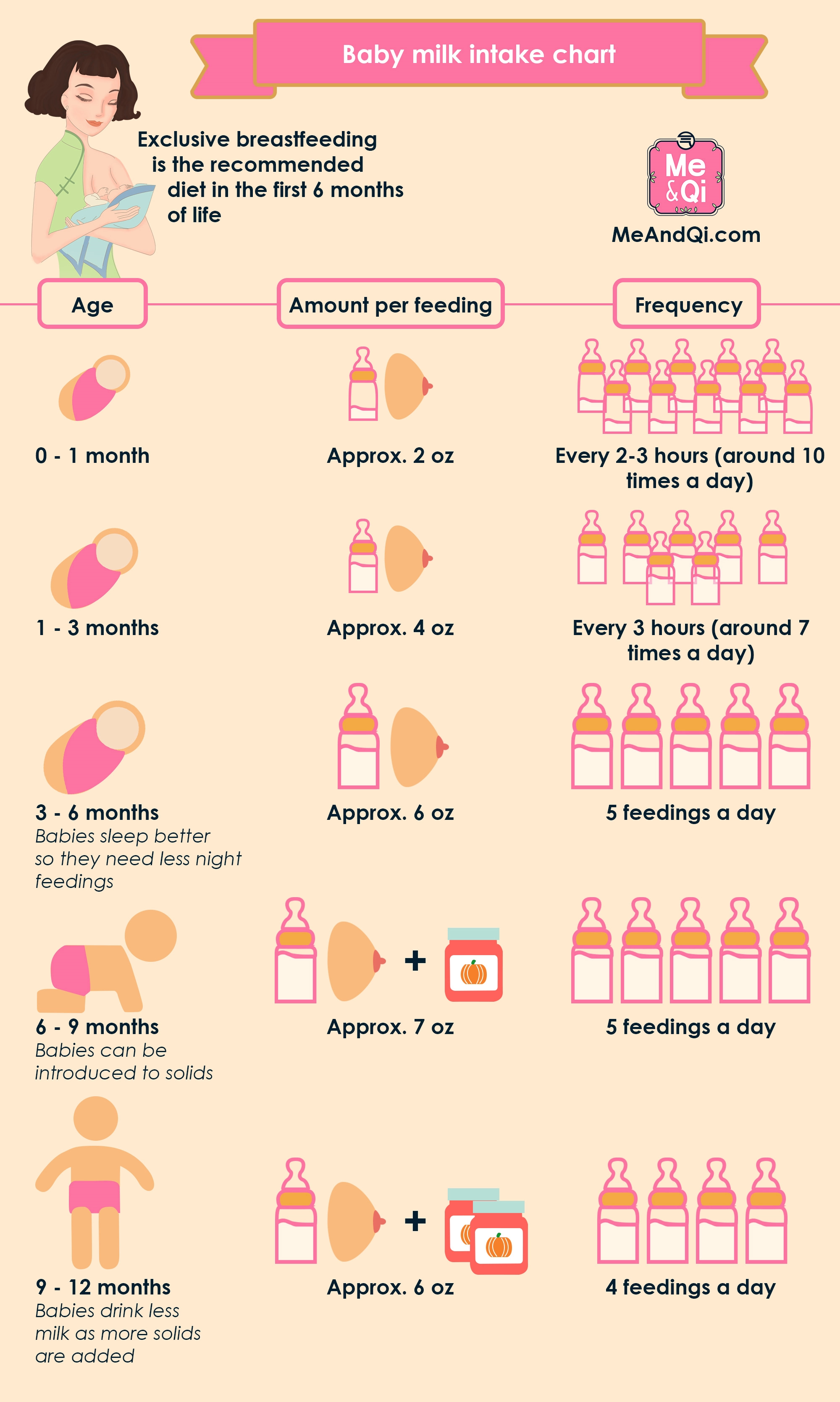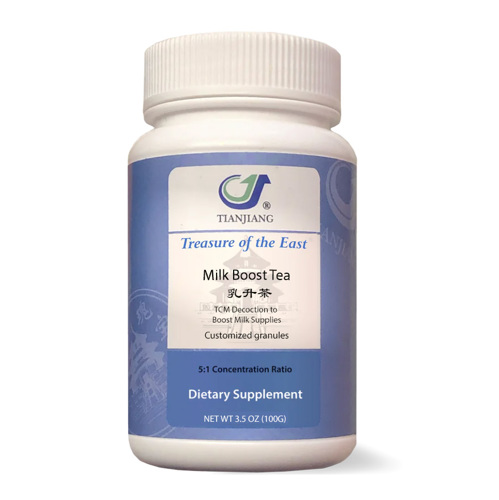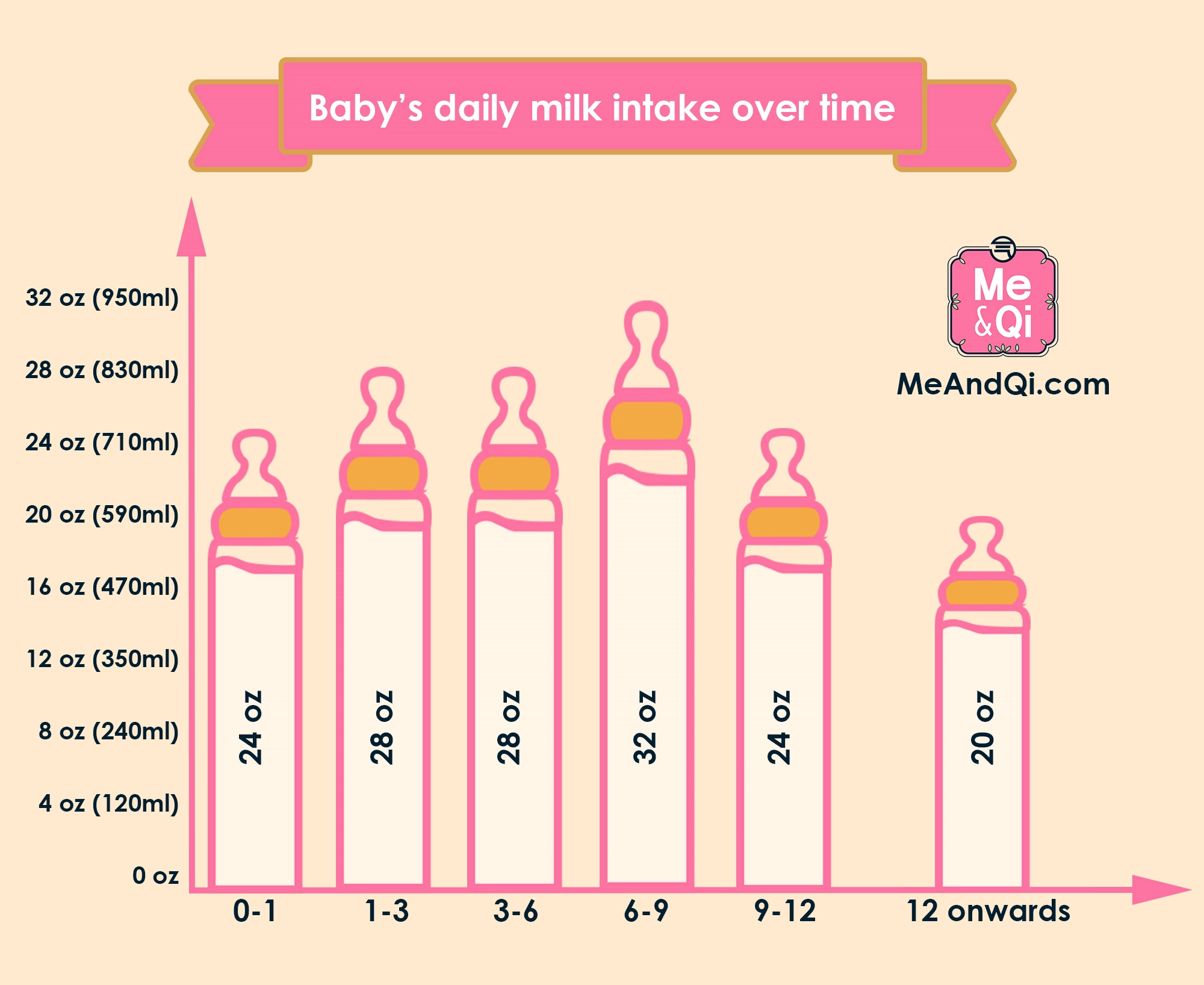Contents
- Baby milk intake chart
- From birth to 1 month old
- From 1 to 3 months old
- From 3 to 6 months old
- From 6 to 9 months old
- From 9 to 12 months old
- Daily milk intake over time
Are you wondering how much to feed your baby? The amount that a baby needs to eat is not an exact science. For instance a baby that was born early will need less food than a latecomer 12lb baby! In general, you know you're doing well if your baby stays on their weight growth curve.
That being said, the trend is the same for all babies. They start their life by eating a little milk each time but doing so very often, as often as every 2 hours. As they grow up, their tummies grow up too so they can eat more milk during each feeding. Because of this, and also because they become better at sleeping, they eat less often.
Let us take you through what you should expect a baby to eat based on their age.
Baby milk intake chart

Click on the image to make it bigger
From birth to 1 month old
Breastmilk: typically you'll need to feed a newborn every 2 to 3 hours. Newborns should be fed on demand but, as you'll find out, they demand a lot! And if they don't, you need to encourage them to eat: you should even not hesitate to wake up your newborn if they haven't eaten for 4 hours. This is the same if you directly breastfeed or feed them expressed milk from a bottle.
The amounts vary but a newborn baby will typically be eating between 1 and 3 ounces (30 to 90ml) of breastmilk per feeding for a total of about 24 ounces (700ml) a day.
At this stage as a new mum you'll likely be faced with one of two problems. You'll either won't have enough milk for your baby, in which case we recommend you use a good Milk boosting tea to help you increase your milk supply.


You might also have the opposite issue where you have too much milk, causing painful engorgement and blocked ducts. In that case you may want to use a tea that helps you unblock your milk ducts and relieve engorgement.
Formula: formula is typically not recommended for newborn babies but if you must, a good rule of thumb is to feed newborns with approximately 2.5 oz of formula per pound of body weight per day. This means that your typical 8 pounds baby will be eating 20 oz (600ml) of formula per day or about 3 ounces (90ml) per feeding if they eat every 3 hours.
From 1 to 3 months old
After 1 month old, a baby's tummy is bigger so they'll be able to eat more each time, typically about 4 oz (120ml) per feeding. They'll also eat slightly (only slightly...) less often, approximately every 3 hours for a total of 7 feedings a day. This means they should be drinking about 28oz (830ml) of milk a day.
At that age the feedings should still occur on demand. They'll likely have started to be more vocal to express their desire to eat so you'll know when they're hungry. Only after 3 months old you can consider putting them on an eating schedule. That being said it's likely the schedule will establish itself naturally between you and your baby without any planning necessary!
Again if you breastfeed you'll likely encounter issues where you either don't have enough breast milk for your little one or you develop painful engorgement or blocked ducts. Not to worry: those issues are perfectly normal and experienced by the vast majority of nursing mums!
There are some great solutions out like Milk Boost Tea to increase your milk supply or Unblock Nursing Tea, a herbal tea that helps you unblock painful engorgement and blocked ducts.

From 3 to 6 months old
By that stage your baby will sleep better and, if you're one of the lucky ones, even sleep through the night! This means they'll be eating less often, only about 5 feedings a day. This also means that they'll be eating more each time, about 6 oz (180ml) per feeding for a total of about 30oz (890ml) of milk a day.
If you're still breastfeeding by that stage, one issue you might encounter if your baby sleeps for longer time periods is that your breasts get too full and painfully engorged at night. It's normal and generally temporary as it takes time for your body to adapt its milk production to your little one's new sleeping schedule. To resolve the issue many mums decide to get up once at night to pump out the excess of milk. This is not ideal as this teaches your body to still produce milk during the night when you actually want the contrary. Ideally you should bear the inconvenience during a few days as your body adapts. Maybe make use of Unblock Nursing Tea to help you relieve the engorgement in the meanwhile.
From 6 to 9 months old
After 6 months old you can start to introduce solids in your little one's diet. The very best thing to start with is oatmeal mixed with breastmilk (or formula if that's what you're using). Make sure to choose baby-friendly oatmeal and, if your baby is on breastmilk, check that it's fortified with iron. Iron is actually the only mineral that breast milk lacks! After your baby is used to oatmeal, you can experiment with pureed fruits, vegetables and meat.
It doesn't mean they'll be needing less milk by that stage, on the contrary! It's at those ages that we're reaching peak milk consumption. They start to be quite big and solids are just a mere snack, 90% of their nutrition will be coming from breastmilk or formula. Expect to feed them approximately 30-35 oz (890ml-1L) a day!
As far as their eating schedule is concerned by that point they should normally sleep for a fairly long stretch at night so they'll only have about 5 feedings a day. This means you'll need to feed them about 7 oz (210ml) per feeding.
From 9 to 12 months old
At this stage solids are more than a mere snack, they should make up about a third of your little one's nutrition.
This means that after months of ever increasing milk consumption, for the first time in their life they'll be needing less milk! The number of feedings per day will typically drop to 4 with about 6 oz of milk (180ml) per feeding for a total of 24 oz (700ml) a day
If you were breastfeeding, this means you'll need to teach your body to produce less milk. Normally it all happens naturally: as your baby eats less, your body will produce less. Sometimes though your body will have a hard time adjusting, resulting in engorged breasts and blocked ducts for a few days. If that happens to you, it's a good idea to use Unblock Nursing Tea to relieve the engorgement.
Instead of reducing your milk production, you could also very well keep it at the same level and store the unused milk in the freezer for later use. This is a great way to prolong the time period during which your little one drinks breast milk. Remember: the longer the better! The official doctors' recommendation is to give breast milk until 2 years old but some mums do so until 3 or 4, and that's great!
Daily milk intake over time

Click on the image to make it bigger
As we can see on the chart, a baby's daily milk consumption will continuously increase until it peaks at around 9 months old. After that, as they're progressively introduced to solids, milk will progressively become a snack as opposed to their main source of nutrition.
For a breastfeeding mother, it's very taxing to adapt to such fast changing needs. Not only does your body need to produce an ever increasing amount of milk during the first 9 months of your newborn, it also needs to change when it produces it as your little one learns how to sleep through the night.
This is why most breastfeeding mothers experience breastfeeding issues that can typically be classified in 2 categories. 1) They either don't produce enough milk or milk that's not nutritious enough for their baby. 2) They have enough milk but the constant changes they need to adapt to leads to engorged breasts and blocked ducts. If you face the first issue we highly recommend Milk Boost Tea: it's packed with herbs that can help you not only increase your milk supply but also with the nutritional quality of your milk. As for the second issue, if you have engorged breasts or blocked ducts, you need to try Unblock Nursing Tea: it will help relieve the engorgement and avoid that the issues worsen into mastitis, a painful infection of the breast.

